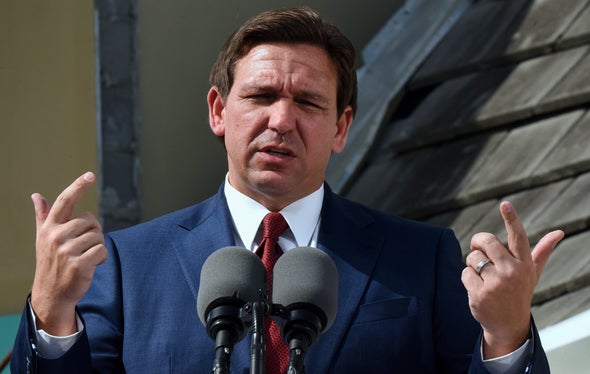DeSantis’s Florida Approves Climate-Denial Videos in Schools

<div class="article-block article-text" data-behavior="newsletter_promo dfp_article_rendering" data-dfp-adword="Advertisement" data-newsletterpromo_article-text="
Sign up for Scientific American’s free newsletters.
” data-newsletterpromo_article-image=”https://static.scientificamerican.com/sciam/cache/file/4641809D-B8F1-41A3-9E5A87C21ADB2FD8_source.png” data-newsletterpromo_article-button-text=”Sign Up” data-newsletterpromo_article-button-link=”https://www.scientificamerican.com/page/newsletter-sign-up/?origincode=2018_sciam_ArticlePromo_NewsletterSignUp” name=”articleBody” itemprop=”articleBody”>
CLIMATEWIRE | Climate activists are like Nazis.
Wind and solar power pollute the Earth and make life miserable.
These are some of the themes of children’s videos produced by an influential conservative advocacy group.
Now, the videos could soon be used in Florida’s classrooms.
Florida’s Department of Education has approved the classroom use of material from the Prager University Foundation, a conservative group that produces videos that distort science, history, gender and other topics.
Education experts call the videos dangerous propaganda.
Florida is the first state to allow PragerU materials in public schools, where teachers will have the option of showing the five- to 10-minute videos in their classrooms. Florida public schools have roughly 3 million students, more than the entire population of Kansas.
PragerU CEO Marissa Streit says the videos will rebalance schools that have been “hijacked by the left.”
“Young kids are being taught climate hysteria,” Streit said in an interview. “They’re hearing that the world is coming to an end, and we think that there needs to be a healthy balance.
“The climate is always changing,” Streit added, repeating a climate-denial motto that rejects fossil fuel burning as the cause of continuing record-high temperatures.
For now, Florida has approved using PragerU videos only in civics and government for younger children. Some PragerU climate denial videos are classified under non-climate categories, which could enable their use in Florida.
But education advocates fear that the nation’s third-largest state has granted a stamp of approval that will spread the videos to classrooms in other states.
Florida’s approval is alarming because children will watch the videos when they are at their most impressionable stage, in kindergarten through 5th grade, said Adrienne McCarthy, a researcher at Kansas State University who tracks PragerU. Extreme ideas are presented as common beliefs in many videos, she said.
“They can take these right-wing, controversial ideas and cloak them in seemingly harmless and friendly rhetoric,” McCarthy said. “Then they create this kind of facade of normal conservative beliefs, and they use authoritative figures [in the videos] in order to convince the audience.”
“It’s also targeted at the parents themselves, saying that if you want to be a good parent, you should be teaching your kids this,” McCarthy added.
Glenn Branch, deputy director of the National Center for Science Education, said Florida is effectively supporting parents and teachers who want to tear down accurate climate science lessons.
Florida’s approval “may be telling climate change-denier teachers about the availability of these materials,” Branch said. Teachers who want to teach climate change accurately could feel coerced to do otherwise “by hinting that there are resources out there with the opposite view, and people are going to be pressuring you into using them.”
Industry talking points, verbatim
Florida Department of Education spokesperson Cassie Palelis said in a statement that the PragerU material “aligns to Florida’s revised civics and government standards” and “is no different than many other resources, which can be used as supplemental materials in Florida schools at district discretion.”
PragerU’s videos use talking points from fossil fuel companies to frame climate science and policy. Many of the videos attack renewable energy sources such as solar and wind.
An eight-minute video, “Poland: Ania’s Energy Crisis,” exemplifies how PragerU introduces climate denialism to children by subtly attacking established science and the people concerned about global warming.
In the video, teenager Ania is concerned about climate change because of what she learned at school. The fossil fuel industry’s climate-denial talking points are introduced almost verbatim in the trusted voice of Ania’s mother and father.
Ania’s parents tell her that the climate has always cooled and warmed — “long before carbon emissions were a factor” — and that climate action is pointless until China and India cut their emissions. Ania also hears that renewable energy is unreliable and too expensive.
Ania repeats her parent’s claims in class and is shunned by her teacher and classmates. Her sadness lifts, however, when her grandfather tells her about life under Nazism in World War II. Ania feels empowered because her grandfather says “fighting oppression always takes courage.”
A PragerU video about a child in Africa features a narrator calmly attacking solar and wind because “their batteries break down and become hazardous waste” and because it’s risky “to rely on things like wind and sunlight, which are not constant.”
Streit, the PragerU CEO, said she wants to ensure schools frame climate science as a debate. A goal of her organization is to reach children when they are at their most impressionable. That’s why Florida approved the PragerU Kids channel content, she said.
“The science is actually contrary to what most educational institutions that have been really controlled by one ideology are saying,” Streit said, rejecting decades of peer-reviewed research by some of the world’s top science agencies showing that humanity is warming the planet at a dangerous rate. “There is debate about the severity of the changing of the climate as well as the pragmatic solutions.”
PragerU’s goal is to develop a “turnkey curriculum” that can be expanded to as many states as possible, Streit said. She expects to announce soon that more states have approved PragerU content and will use it for classrooms in all grades. PragerU is developing a curriculum module that could be used for course credit in high school, Streit said.
DeSantis leads the way
PragerU’s foray into approved classroom use comes as conservative states and politicians aggressively seek to dismantle curriculum in African-American history and LGBTQ+ issues.
The leader has been Florida Gov. Ron DeSantis, a Republican running for president. DeSantis recently faced loud, bipartisan condemnation after education officials in his government released new curriculum standards that say enslaved people gained “personal benefits” from a lifetime of forced labor.
Less documented are the conservative efforts to tear down climate science and to promote in classrooms the use of fossil fuels.
Florida is just the latest state to open the door to climate disinformation. Texas changed its science curriculum to require that schools teach positive lessons about fossil fuels. It’s an effort to downplay accurate climate science and to influence the national textbook market, since Texas is one of the biggest consumers of educational materials in the U.S.
Climate scientists long ago determined that fossil fuel use is driving rapid global warming and pushing the planet toward dangerous tipping points. Most states center their climate change curriculum around that consensus. Only a small number of researchers with legitimate academic credentials doubt the consensus science, and PragerU videos feature many of them.
PragerU’s website contains thousands of videos, which have a variety of classification tags to help users find its videos on topics such as civics, financial literacy or government. Climate denial videos, including some pushing conspiracy theories like the “Great Reset,” are classified with tags other than climate change, such as “government,” “global issues,” “life lessons” and “freedom,” which lets them qualify for approved use outside of science classes.
PragerU also has materials that avoid partisan slants, including videos explaining the Electoral College and the offices of the president and vice president.
In Florida, DeSantis has long assailed what he says is liberal “indoctrination” in education. PragerU co-founder Dennis Prager, a nationally syndicated conservative radio host, has proclaimed that his PragerU materials are specifically designed for “our indoctrination.”
“It’s true we bring doctrines to children,”Prager told the conservative group Moms for Liberty at a conference in Philadelphia in July. “But what is bad about our indoctrination?”
PragerU has produced anti-climate policy videos since shortly after it began in 2009. The Prager foundation has received millions of dollars from the billionaire brothers, Farris and Dan Wilks of Texas, who made their fortune in fracking. Wilks funding also was essential to the growth of The Daily Wire, a popular website and media company that routinely pushes climate disinformation.
PragerU has received additional funding from foundations that oppose climate regulations such as the Lynde and Harry Bradley Foundation.
PragerU’s video library goes far beyond climate change and introduces viewers to a worldview framed around the belief system of the far right.
PragerU CEO Streit said her group has tapped into angry parents who want their politics reflected more in classrooms.
“Many of us, as parents, don’t feel like we’re being heard,” Streit said. “We feel like we’re being gaslit, so we’re hoping that this product will better explain to everyone what we want to see in our children’s schools.”
Reprinted from E&E News with permission from POLITICO, LLC. Copyright 2023. E&E News provides essential news for energy and environment professionals.
This article has been archived for your research. The original version from Scientific American can be found here.


